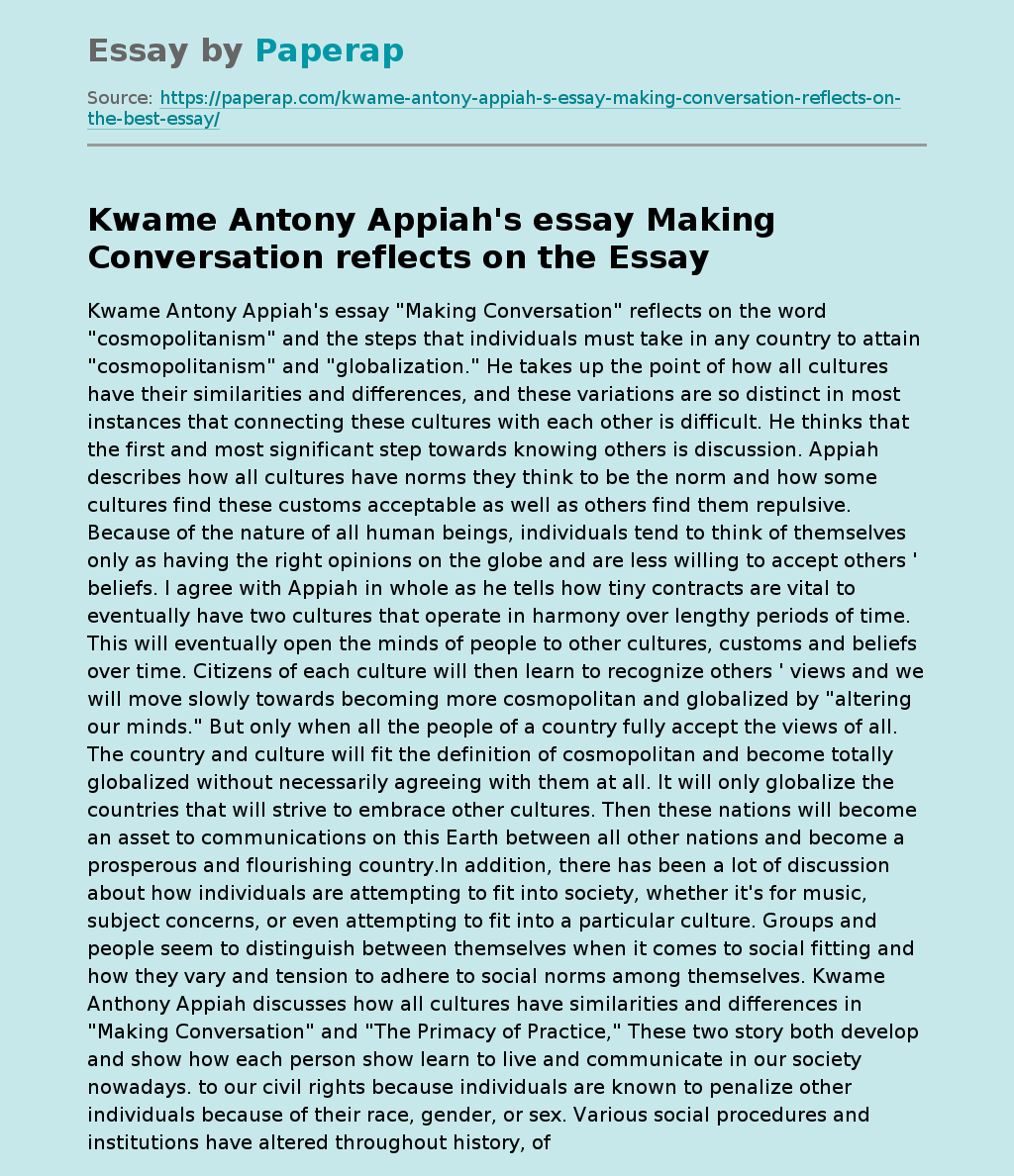Kwame Antony Appiah's essay Making Conversation reflects on the
Kwame Antony Appiah’s essay “Making Conversation” reflects on the word “cosmopolitanism” and the steps that individuals must take in any country to attain “cosmopolitanism” and “globalization.” He takes up the point of how all cultures have their similarities and differences, and these variations are so distinct in most instances that connecting these cultures with each other is difficult. He thinks that the first and most significant step towards knowing others is discussion. Appiah describes how all cultures have norms they think to be the norm and how some cultures find these customs acceptable as well as others find them repulsive.
Because of the nature of all human beings, individuals tend to think of themselves only as having the right opinions on the globe and are less willing to accept others ‘ beliefs. I agree with Appiah in whole as he tells how tiny contracts are vital to eventually have two cultures that operate in harmony over lengthy periods of time. This will eventually open the minds of people to other cultures, customs and beliefs over time.
Citizens of each culture will then learn to recognize others ‘ views and we will move slowly towards becoming more cosmopolitan and globalized by “altering our minds.” But only when all the people of a country fully accept the views of all. The country and culture will fit the definition of cosmopolitan and become totally globalized without necessarily agreeing with them at all. It will only globalize the countries that will strive to embrace other cultures.
Then these nations will become an asset to communications on this Earth between all other nations and become a prosperous and flourishing country.In addition, there has been a lot of discussion about how individuals are attempting to fit into society, whether it’s for music, subject concerns, or even attempting to fit into a particular culture. Groups and people seem to distinguish between themselves when it comes to social fitting and how they vary and tension to adhere to social norms among themselves. Kwame Anthony Appiah discusses how all cultures have similarities and differences in “Making Conversation” and “The Primacy of Practice,” These two story both develop and show how each person show learn to live and communicate in our society nowadays. to our civil rights because individuals are known to penalize other individuals because of their race, gender, or sex. Various social procedures and institutions have altered throughout history, often because they are no longer considered helpful or acceptable. Both writers may agree on how sometimes society tries to fit in and not understand how significant diversity is in a community. Despite all the similarities People may have distinctions that may be more strong if social norms are to be complied with. However, discussion is the key to comprehension, discussion is sometimes not enough to produce a healthy change, as it becomes more complex when there are obstacles that prevent individuals from being special because they have their own cultural background.Conversation is a way of understanding and listening language. Understanding the differences and similarities that individuals have within other individuals is crucial, just trying to acknowledge the reality that some individuals may be distinct. Appiah thinks that more acceptance, more globalization is needed for individuals. Initially, he feels that discussion can lead individuals to change and may hinder why they fit in because they are distinct. Conversation, however, is not enough because individuals are still changing to fit in, individuals are constantly feeling left out, not appreciated for their customs or beliefs. In the text Appiah states ?We can live together without agreeing on what
the values are that make it good to live together; we can agree about what to do in most cases, without agreeing about why it is right.? (page 43). In this quote what he means to say is that all of us live in a world together where we all disagree but the values that truly matter are the ones that are right. Conversations between people are the number one key to understanding how one another feels. Everyone has various values, beliefs, and rituals that make them who they are. It’s component of your identity, your culture. Removing those private values is like removing who they are. Everyone is made up of distinct names, tones, accents, foods, etc. These variations make everyone special and make a world that’s varied. Such differences make everyone special and make a world that’s varied. Some individuals don’t know the differences of other people and just look at their own and think they’re just right. Comprehending the differences of someone else is respect and allowing them be. Learning and sharing with one another is a perfect thing in communicating with one another.In conclusions, Appiah thinks that individuals need to be more cosmopolitan and globalized, meaning they need to be more varied than a state or local group in a wider world society. It is obvious that Appiah thinks that individuals communicate more when similarities exist and that individuals tend to have this duty to do so. However, when the bond attempts to be shared when there are variations engaged, it is more complex. Overall, he believes that everyone should be living in a world where everything can be globalized and no disagreement can be going on due to the fact that these types of things are unhealthy to be around and when people spend too much time trying to find into a place with other people they may be stressed and it would be hard for them to fit in and feel comfortable.
Kwame Antony Appiah's essay Making Conversation reflects on the. (2019, Dec 10). Retrieved from https://paperap.com/kwame-antony-appiah-s-essay-making-conversation-reflects-on-the-best-essay/

